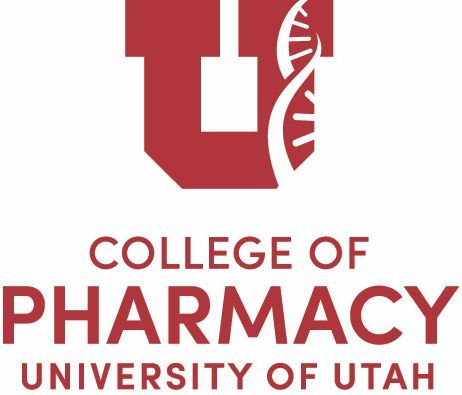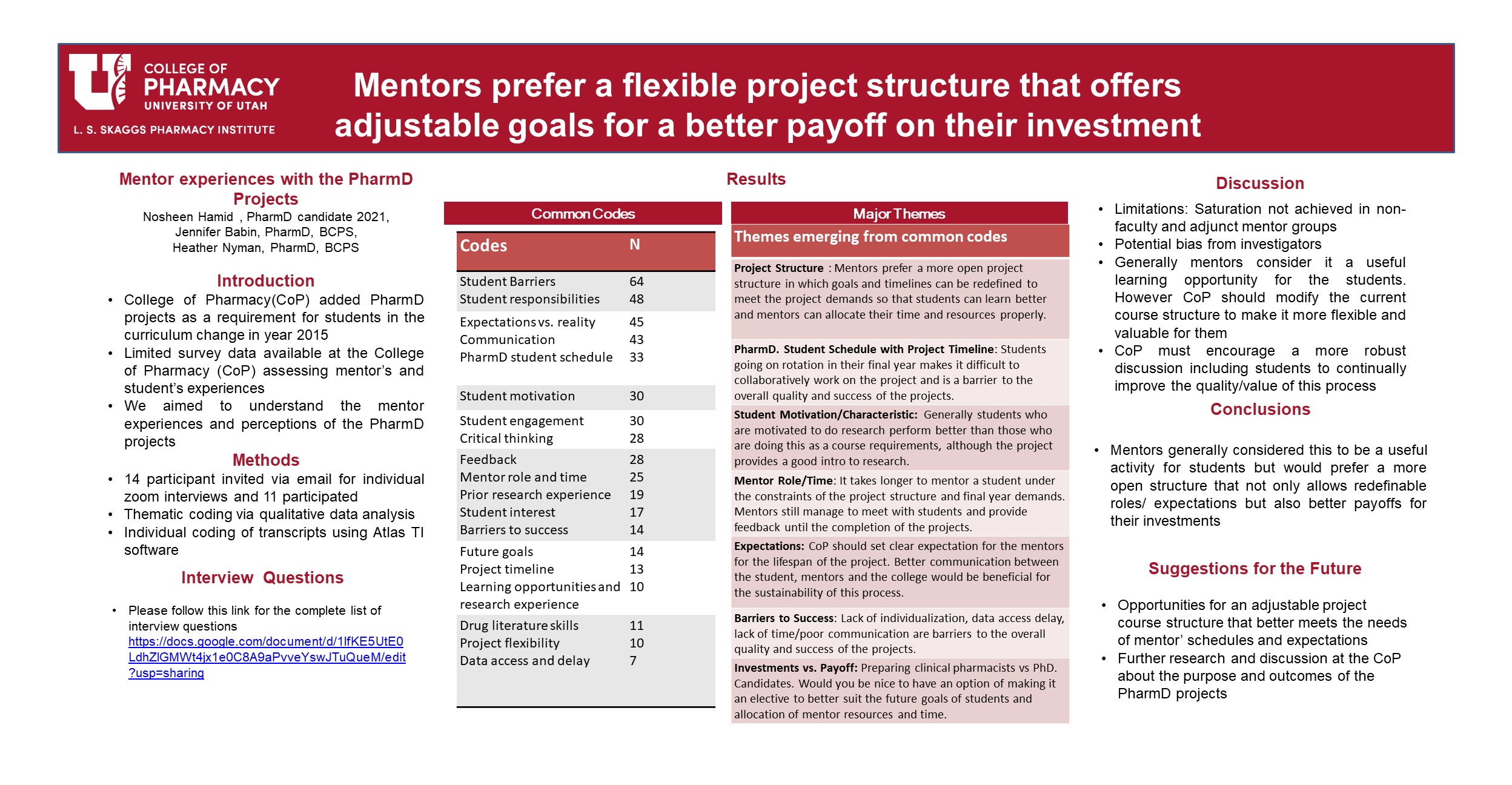Introduction
The College of Pharmacy (CoP) at the University of Utah underwent significant curriculum change in 2015 for the PharmD program. One of the changes was a new requirement for all PharmD students to complete a two-year research project beginning in the third year of the program. The students are assigned a designated project mentor for two years. With 60 students (on average) per class and two years of students working on their project, 120 student projects are ongoing at any given time. At a College Council meeting at the CoP in 2019, some faculty expressed concern about the time it takes to mentor students. The CoP has limited survey data assessing mentor experiences, but we lack insight on mentor’s perceptions and experiences of the PharmD project. This study engaged mentors in a conversation that led to a better understating of their core experiences. 1-3 This quality-improvement project aimed to begin a systematic investigation with the hope to increase our knowledge and understanding of the individual experiences of mentors. These projects’ sustainability is impossible without mentors. We developed theories that helped us propose ways to improve the overall process for the mentors.
Methods
Study participants: Project mentors for the PharmD classes of 2019, 2020, and 2021. Faculty investigators interviewed selected participants. Recorded interviews were transcribed, and thematic coding was conducted using Atlas Ti to make recommendations to the college council.
| Department | N= | Track | N= |
| Pharmacotherapy | 6 | Clinical | 2 |
| Medicinal Chemistry | 1 | Tenure | 4 |
| Pharm Toxicology | 2 | Research | 2 |
| Pharmaceutics | 1 | Adjunct or other | 3 |
| None | 1 |
Conclusions
Overall, most mentors considered the PharmD projects to be a valuable activity for the students. Still, some argued that this only serves as an introduction to research for students since most PharmD students are not planning to pursue a career in research or academia. Mentors participating in PharmD projects would like a better return on their investments other than a poster presentation and probable publication. Further research is warranted, including students to make it a collaborative effort to gain insight into their mutual experiences, so the overall quality of this process can be improved. The themes provide opportunities for the project structure to opened up and made more flexible to accommodate the variety of schedules and projects being mentored during the two years.
REFERENCES
- Principles of Project Development. Syllabi, the University of Utah. Craig Henchy, PhD. Kristen Keefe, Ph.D. Daniel M. Witt, Pharm.D.
- Kim SE, Whittington JI, Nguyen LM, Ambrose PJ, Corelli RL. Pharmacy students’ perceptions of a required senior research project. Am J Pharm Educ. 2010; 74(10):190. Doi: 10.5688/aj7410190
- Implementing PharmD Student Research and Quality Improvement Projects at the University of Utah. Craig Henchy, PhD. Kristen Keefe, PhD.; Mark Munger, Pharm.D. Daniel M. Witt, Pharm.D.
- McClendon KS, Bell AM, Ellis A, et al. Pathways to Improve Student Pharmacists’ Experience in Research. Am J Pharm Educ. 2015; 79(4):58. Doi: 10.5688/ajpe79458
- Slack MK, Martin J, Worede L, Islam S. A Systematic Review of Extramural Presentations and Publications from Pharmacy Student Research Programs. Am J Pharm Educ. 2016; 80(6):100. Doi: 10.5688/ajpe806100
- Assemi M, Ibarra F, Mallios R, Corelli RL. Scholarly contributions of required senior research projects in a doctor of the pharmacy curriculum. Am J Pharm Educ. 2015; 79(2):23. Doi: 10.5688/ajpe79223




Responses
Norsheen – congratulations on this excellent work!!!. This work addresses a very important question which help us improve the way to provide our PharmD students positive experiences with PharmD projects. I like the key findings “flexible project structure” which provides adjustment of roles and expectations for the whole project. To me, PharmD project may provide our students an exposure of research in a way that can be applicable to their future career or their interest. Look forward to seeing the use of your research findings for our program improvement in the near future. Thanks.
Thank you for your comment! Yes, I agree that PharmD. projects provide a great learning experience for the students but has room for improvement to better accommodate the mentors.
If you were to recommend one single thing to improve, what that would be?
I would recommend adjustable project timelines depending on the type of the projects the students are engaged in. This would allow the mentor and student to come up with a timeline that better suits their project instead of having standard course rules around the projects. I recognize that it poses a tremendous challenge for course instrcutors when we have about 60 students per class (P3 and P4), all working on projects for the two years but I think it would streamline the process even further and ensure maximum mentor and student satisfaction. Thank you!
Hi Nosheen,
What would be your top 2-3 recommendations regarding any changes that should be made to the PharmD project program to address some of the themes you discovered during your analysis?
Good evening Dr.Witt,
Thank you for you comment. The following would be my top three recommendations:
1- Adjustable project timelines that are not strictly governed by the project course structure. This would offer more flexibility to the mentors so that they can customize their project design and have better outcomes.
2- Start the project class earlier than third year so that students have more time to learn the research skills and finish their projects before they start clerkships. Communication between mentors and final year students greatly diminishes due to the P4 schedule and I believe it has a direct impact on the progress and quality of the projects.
3- I would also suggest conducting focus groups that include students and mentors so that we can ask in-depth questions about the two year experience. We had a small data set but I strongly believe that opinions of all mentors count and can provide insight into how this process can be individualized for each mentor representing a different department. Class survey conducted at the end of semester are helpful but mostly do not require that we out in comments, even though it is encouraged, therefore I presume that focus groups can be beneficial in addition to surveys.
Thank you!
what a great poster & project! What are 2 things you earned from doing the project? Was it worth your investment?
Thank you so much Dr. Nickman. I learned a lot about qualitative research methods and grounded theory. I also learned that mentors put in immense energy and effort into the projects from start to finish. It was challenging due to Covid restriction and final year schedule but definitely worth it. thank you !
The results section came together well. Nice work! I think we should look at ways of adding a more flexible timeline. I know some of our original concerns with being too flexible is that students might just put off the work, and that it might place more on the mentors, since the class might not be able to provide as much feedback with students on different schedules. Hopefully we can find a good balance.
Dr. Henchey,
Thank your feedback! The flexible timeline recommendation is mainly for mentors so they can modify the project deadlines according to their schedules and successfully meet the project expectations. I agree that students work better with due dates/deadlines set up by the project courses. Thank you!
Wow thought provoking. All three suggestions are excellent. As I was reviewing all the posters, i was gaining insight into the amount of time, resources, detail, and accuracy required by all involved.
Thank you Jane! Yes, it is a lot of work 🙂 but certainly worth it!
Hi Nosheen, This is important work and you executed and presented the qualitative research very well. Do you think it would be possible to use the important themes you identified from your interviews to construct an online survey so that you could get a larger sampling of faculty? Also, do you think COVID had any impact on your results? For instance, did COVID cause significant lengthening of project timelines or add another barrier to communication?
Thank you so much Dr. Blumenthal! I think that is a wonderful idea, I will chat with my project mentor about it and see if this could be incorporated in future research regarding PharmD projects. Covid definitely had an impact on the sample size of our study and made it more difficult to adequately and effectively communicate with mentors. Students were still able to (virtually) meet with mentors and complete their projects but I strongly believe that Covid made it more challenging to have a proper communication channel. Thank you!
Comments are closed.